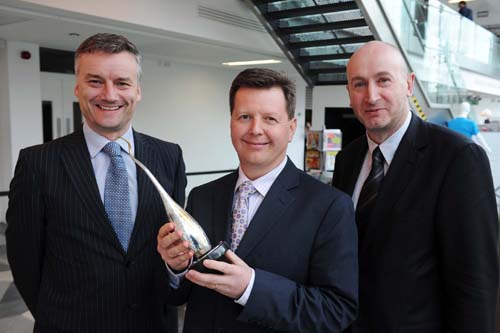Trinity Innovation Award Presented to TCD Computer Scientist and Founder of Cutting Edge Spin Out Companies
Posted on: 13 April 2012
The Trinity College Dublin Innovation Award was presented to Trinity computer scientist and entrepreneur, Dr Gerard Lacey.
The Trinity Innovation Award is an annual award presented each year to an individual or company that has made an outstanding contribution to the promotion of an entrepreneurial culture within the University and society.

Provost Dr Patrick Prendergast, Dr Gerard Lacey, and Dean of Research Professor Vinny Cahill.
On presenting the award to Dr Lacey, Trinity Provost, Dr Patrick Prendergast said: “The significance of this award is that it recognises the courage and excellence of an academically trained researcher who has exploited the results of his research in a highly competitive marketplace.”
“The creation of an entrepreneurial culture within Trinity and the development of entrepreneurial students are vital if students are to maximise their potential in an increasingly challenging economic environment, nationally and internationally. The Innovation Award rewards role models within the University who can motivate students to follow their examples. It is not just about new venture creation, but also the ability to develop graduates with entrepreneurial mindsets who can innovate in whatever careers they choose.”
Trinity College Dublin technology accounted for approximately 20% of the Life Science deals in Ireland in 2011. In the fourth quarter of 2011 alone, three of Trinity’s campus companies raised a total of €6.5million in venture capital funding. Genable Ltd, a gene based medicines company, completed a €5m financing round led by Fountain Healthcare Partners alongside existing investors Delta Partners. Biocroi Ltd received €800,000 in investment from Kernel Capital, and Trimod Therapeutics Ltd raised €750,000, from, among others, Oyster Technology Investments, Ltd, Enterprise Ireland and Opsona Therapeutics.
Dr Gerard Lacey, Associate Professor in the School of Computer Science and Statistics is an excellent example of an entrepreneurial graduate who has followed the classic cycle of entrepreneurship from laboratory research to success in the marketplace. A Trinity graduate of Computer Engineering, Gerry subsequently undertook PhD research on mobile robotic aids for the elderly visually impaired and he founded his first company, Haptica, based on his thesis, and led the team that developed the ProMIS surgical simulator which won several innovation awards, including a European IST prize and the Irish Software Association Technology Innovation Prize. Haptica was acquired by CAE Healthcare in 2011.
Gerry returned to Trinity College in 2005 to resume his research and lecturing career. Since then he has founded a second company, Glanta Ltd, in 2010 to commercialise the SureWash hand hygiene training system SureWash makes hand hygiene training and compliance much less labour-intensive by combining an e-learning system with patented video measurement technology. Developed over five years in Trinity College Dublin, SureWash was trialled in Beaumont Hospital, Dublin and by the UK Department of Health in the Mid Essex NHS Trust, UK. Hand hygiene rates per patient day more than doubled and compliance with hand hygiene technique tripled. Glanta is now engaged in a second round of funding, having opened an office in Australia, and developed a strong distribution network in Europe. There is also strong interest from multi-national corporate bodies and healthcare distribution companies in Asia and the US.
A third element of his research, the Wingwatch aircraft warning system, has been licensed to CMC Electronics. At Trinity, Gerry’s new ideas and knowledge of business development are harnessed to contribute to the education of entrepreneurial graduates. Gerry is an active supporter and motivator of entrepreneurship education in Trinity College Dublin where he has generously given his time to encourage the learning process through his participation in the Entrepreneurship Programme run by Trinity Research & Innovation, through his support to the activities of the TCD-UCD Innovation Academy, and his work with undergraduates in the area of entrepreneurship in the School of Engineering.
Trinity has a high success rate in spinning out companies with 76 companies formed since 1985 from a range of Departments and Schools – History, Language Learning, Law, medicine, Physics, Biochemistry, Engineering, Biology, Energy conservation, Nanotechnology, Computer Science among others.
As a result of a more open innovation approach to the commercialisation of intellectual property and the investment in commercialisation by Enterprise Ireland through the Technology Transfer Strengthening Initiative (TTSI) leading to the appointment of dedicated Technology Transfer Case Managers in ICT, Life Sciences, Physical Sciences and Medical Translational Services, coupled with revised campus company procedures has resulted in an increased rate of spin-out activity with seven companies created in 2011. This demonstrates an important new impact of Trinity College Dublin research, directly contributing to the Irish economy in terms of job creation.
